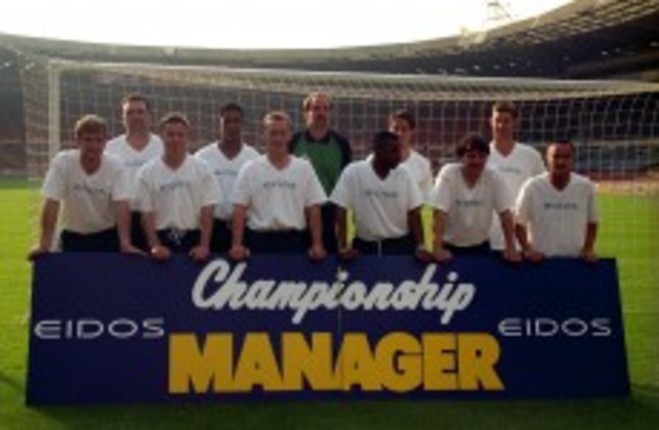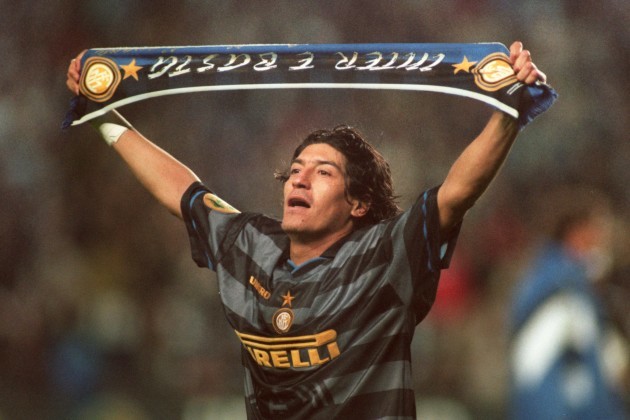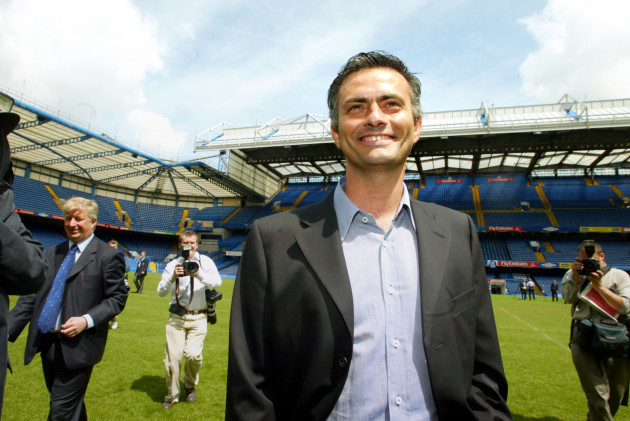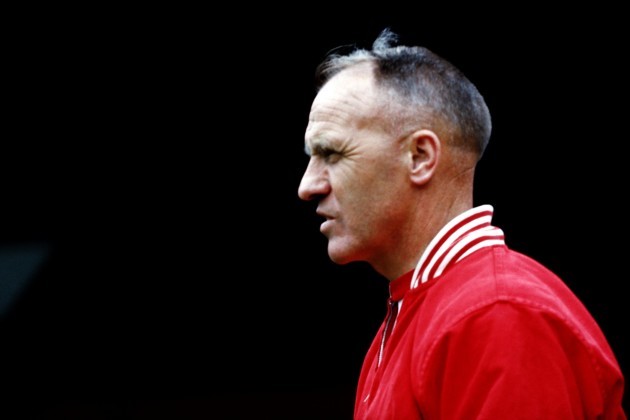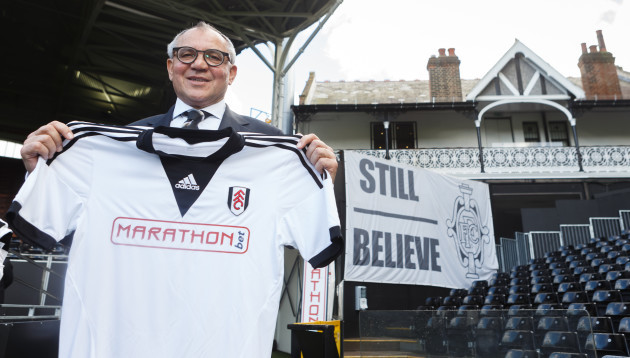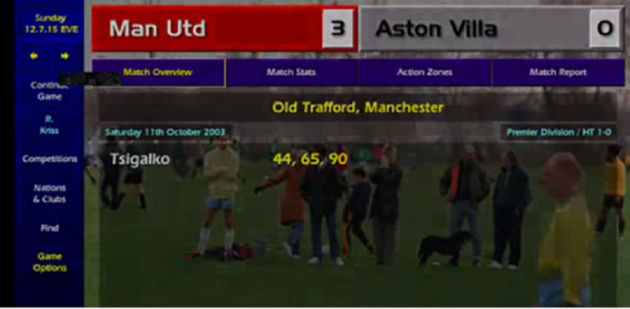THE42 RECENTLY INTERVIEWED renowned football journalist and author Iain MacIntosh. Iain has a new book out entitled ‘The Football Manager Guide to Football Management,’ published by Century, which is described as a book ‘for anyone who has ever believed that they do a better job than their club’s manager’. Read the conversation in full below….
What inspired you to write this book? Explain the background behind it.
I’m one of those people who, when I read a long-form article about football, a broadsheet interview with a football manager or a 4,000-word piece on Ajax’s youth academy, I kind of start to vibrate with excitement. I need to play Football Manager and I need to work out all the theories like some giant thought experiment.
I wanted to write a book that basically did that to everybody over and over again. So the book is basically a whole load of case studies and stories and interviews that might inspire you to play Football Manager a different way or influence the way you think. It might make you vibrate with desire.
I think it reconfirmed one suspicion, which is that there’s so much stuff we don’t know. When I first started writing about football in 2007, I was very sure of myself — I was sure of everything I wrote. Now, I’m not sure of anything.
The deeper you go, the more you realise how much you don’t know. If there’s anything that hasn’t come out of it, there’s the fact that there isn’t any overriding discipline in football that will make you win. It’s not just a case of having better tactics or running better numbers, it’s just glorious chaos. Only having a huge combination of everything available can really help. Everyone’s got to be working to the same end.
Tell us about your longstanding love of Football Manager, and do you have any achievements you’re particularly proud of?
I’ll always be proud of winning the Uefa Cup with Southend in Championship Manager 97/98 with Zamorano up front. That’s probably the best I’ve ever done. I tend not to manage Southend when they’re doing well, because I’m scared of ruining them.
I tend to manage whatever big team has fallen on hard times — it’ll probably be Aston Villa this time. I’ll always have a game where I start with the lowest possible reputation and try to work my way up. The first football manager game I played was Football Manager in 1984/85 — the Kevin Toms version on the 48k Spectrum.
I fell in love with that when I was about eight, I think, and I’ve been addicted since then. Games like Tracksuit Manager on the Spectrum were incredible. Football Masters on the Atari ST, which actually had real player names — that was groundbreaking at the time. And then Championship Manager popped up in 1992 — the very first version had four divisions and 20 teams. If you went into Europe, which was quite a novelty at the time because English clubs had been banned for so long, it would say ‘player 9 gets the ball, passes to player 7′.
But you could tell, instantly, that it had smashed the genre to pieces for the simple reason that, for the first time, it didn’t all revolve around you. It didn’t even need you. You didn’t have to be a part of it for it to continue, quite happily, simulating its own universe. There was something hugely exciting about that.
You weren’t just facing one game after the other after the other and then you get a job at another club. You were part of an alternative world, testing yourself against the game, because there was something so tremendously exciting about having a game that had the balls to say ‘you’re not very good and I’m sacking you’.
There’s a school of thought that managers tend to be overrated — (the author and journalist) Simon Kuper has suggested it — and that the richer clubs will always ultimately prosper no matter who’s in charge. Do you subscribe to this theory? How important are managers?
I think managers are important. I’m sympathetic to Simon’s view, because money is so important ultimately. If you can throw down 11 world-class players who are better at football than the other 11, fortune’s going to favour you. But I think, what a manager can do, is find a way to make a team more than the sum of their parts. A bad manager can do a lot of damage.
A bad management structure can do a lot of damage as well. Imagine if you’ve got kids in the youth academy who have the potential to be brilliant, but they’re not being coached or mentored properly, or there’s no aspiration there.
But there’s so many different aspects — look at Chelsea when Abramovich came in under Ranieri. They spent so much money in that first season. It was like someone was cheating on Championship Manager. But they didn’t get close to Arsenal. Ranieri went and Mourinho came in, and there were some extra players, but the spine of the team was largely the same. He was making them work as a team, and they didn’t just win that league, they cruised the following season as well. And had they not lost both their goalkeepers to injury in the third season, they might have won a domestic treble — they won the League Cup, the FA Cup and came second in the league.
Mourinho does so much in changing the way that they played and the way that they acted as professionals that even Avram Grant can take over and they’re pretty much running on inertia, and they nearly won the Champions League. That’s what a great manager can do. You see that all over the world — Inter Milan for years, up until Mourinho, wasted so much money and they couldn’t win anything.
The indicator is the more you spend on wages, the higher up you go, which is kind of fair. I think you’re not going to win unless you spend money, but spending money is no guarantee you’re going to win. You need a structure to tie it all together and maximise every advantage you have. And that structure isn’t just the manager now, because you need everyone on the same page working towards the same aim.
There’s an interesting reference in the book to the Liverpool team of the Paisley and Shankly era in the book, where it’s suggested that it took new players months to adapt to the ways of the team and to play regularly for them. A lot of people seem to assume that tactics were fairly unsophisticated prior to the Premier League era — is this perception unfair?
It depends who you talk to — Jimmy Case will say there were no tactics, no team talks, we just went out and played football. Kenny Dalglish wrote in his autobiography about it and said it was all very cute and cunning.
The idea given to the (Liverpool) players was that there weren’t any tactics. But what they were doing with the constant five-a-sides was sharpening their ability to play that kind of improvisational football. Every now and then, they’d get told one team to play a little bit deeper and one team to play on the left-hand side, because the scouts had isolated little weaknesses.
The idea that everybody was getting shit-faced all the time and then running out the tunnel at three o’clock is probably a bit of a misnomer. But one of the clever ways that Liverpool operated is that they made it all look and feel easy, even though it wasn’t.
Jonathan Wilson is quoted in the book as saying that the football they played looked easy, but it really wasn’t. You had to practice hard to be able to play that sort of game.
I remember talking to Tony Woodcock about 10 years ago, when 4-5-1 was in vogue, and everyone was saying how 4-5-1 had ‘completely changed football’. He was just laughing saying Brian Clough and Peter Taylor used to have us do that in European games. So there’s not much that’s new.
Is it fair to say managers have to be far more sensitive towards players now?
Absolutely. And we’ve seen on many occasions when managers try and go back to the ‘good old days,’ it all goes horribly wrong — look at Felix Magath at Fulham. Ultimately, it’s just management, it’s dealing with people. You need to find out what makes those people tick and what motivates those people and what scares those people and how you can make that work in their favour.
And society, in general, has changed. It’s not as subservient as before, it’s richer and more comfortable than before, so those fears — you had an awful lot of players before the 80s who had grown up in quite profound poverty, so there would have been a constant fear of losing their jobs and losing their livelihoods. Plus, they had no power — they were pretty much just goods to be traded around. So managers could actually scare the shit out of you and the wages weren’t so high.
Barry Fry is quoted as saying that ‘in the old days, you scare a player by saying I’m going to fine you a week’s wages’. Nowadays, it means absolutely nothing to them. Imagine earning 100 grand a week and the club’s paying you to live in a hotel. You don’t own anything and you have nothing to tie you down. You’re just getting 100 grand a week. That’s not going to be a good way to scare people. That’s the art of management — finding out what motivates people and what scares them.
One other big talking point is that British coaches are supposedly looked down up compared to foreign coaches. Sam Allardyce has suggested it a couple of times. Is this true, do you think? Or are foreign coaches generally just at a higher level or more advanced for one reason or another?
I don’t think foreign coaches, as a whole, are more advanced than British coaches. Perception is a huge problem. One of my favourite football columns of all time pointed out that Arsene Wenger is from Alsace — a region that changed hands between France and Germany. Wenger came to Arsenal and was hugely successful. We had a run of French managers in England and no German managers. So we had all of these French managers and not one German — even though, it could very easily have been Arsene Wenger, the German manager.
Perceptions leads us to believe certain things — he’s French, he must be good. I think certainly, in the late 90s that was the case, with the success of the French football team. I think some owners and some chief executives have a natural understanding of football. Some don’t. Some just read the papers and go with whatever’s in vogue at the time. Managers are individuals — there are some very good ones and some very bad ones. Some clever, some more intuitive ones. I don’t think there’s anything in the DNA of British people to make them weaker at this than anyone else.
One thing that might be the case is that very few English managers have ended up in the top jobs, so there hasn’t been the opportunities to win the top prizes. It doesn’t help that, sometimes, when they have got the top jobs, they’ve fallen short. But when you look down the seasons and through the years and see how many top teams have been managed by English or even British managers, there’s hardly any.
What I don’t think helps is the reluctance of British managers to live abroad. I can’t remember who it was — there was someone complaining about all the foreign managers taking the jobs and it never seemed to occur to him that he could go over and take theirs. It was a manager who believes quite strongly in analytics and technology. So I’ve the utmost respect for anyone who goes out and (manages abroad).
You devote an entire chapter in the book to ‘the media’. How important do you think it is for a manager to be proficient at handling the media? Is it a case of journalists such as ourselves over-estimating its importance, or is it genuinely a vital part of the role?
I think it’s absolutely crucial. I don’t think it should be absolutely crucial. Why should it be a big thing that you’re good with the media? It goes back to that word ‘perception’ — look at Jurgen Klopp when he arrived at Liverpool, and suddenly everyone’s eating out of his hand. They want success.
Someone who’s like that in public — it won’t save them forever as ultimately, results will have an impact and managers are generally sacked for the thing that got them the job in the first place. Tim Sherwood was ‘really honest and forthright,’ and now it’s: ‘All he does is talk.’ All of this changes very quickly — it’s managing PR in what is a very difficult position, and it’s crucial.
And finally, getting back to Football Manager, I used to play it a lot and for instance, I’d suddenly be able to name Roma’s starting XI off by heart after playing it for a while, whereas before, that wouldn’t have been the case. Do you think it could genuinely help a manager, as playing it can be quite educational? Or is this just the kind of thing Football Manager fans such as you and I tell ourselves to attach greater significance to the game than it actually merits?
I think there are plenty of aspects that are helpful, which is one of the reasons why the database is now linked up with Prozone, because as a database of biographical details, it’s absolutely impeccable, there’s so much information there that’s genuinely useful. Places of birth for eligibility and ages and club histories… As a journalist, I find that kind of stuff hugely important.
On the odd occasion, you might write about Barcelona. Where else are you going to find really authoritative, trustworthy records of their past seasons from the last 100 years? I haven’t found anywhere I trust quite as much as the Football Manager database.
I also find as a journalist that the familiarity really helps. I’ve barely been able to play the last one because I was too busy writing the book — Football Manager and book deadlines do not go well together.
But I’ve noticed in the last year that my familiarity with the football teams I’m not usually watching has really drifted off. Whereas when I was playing Football Manager regularly in 2012, I could probably tell you maybe not the complete starting line-ups but certainly the core of most of the big teams in Europe. So I think there’s something to be gained from that as well.
You kind of feel like you know the players more than you do, don’t you? I remember at one point suspecting (a then-young Brazilian centre-back) Lucio was really good at dribbling without ever having seen him play.
It’s a very slippery slope and I work very hard to ensure that Football Manager is a game that I enjoy and football journalism is a job I take very seriously.
There was one occasion when Newcastle signed (Davide) Santon and I thought: ‘Bloody hell, that’s a good signing.’ And then immediately, I thought: ‘You’ve never seen him play. You had him on Football Manager and he was brilliant, but you’ve never seen him play.’
So you sort of have to stop yourself every now and then. It’s a testament to how much fun it is and that’s what it is at the end of the day. It’s hugely immersive, addictive fun.
The Football Manager’s Guide to Football Management is published by Cemtury. More info here.
